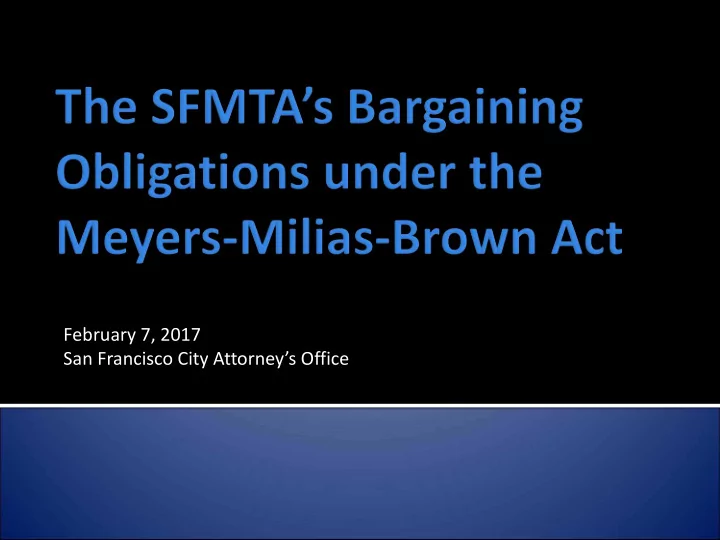

February 7, 2017 San Francisco City Attorney’s Office
The Meyers-Milias-Brown Act (Gov. Code § 3500 et seq .) (“MMBA”) was adopted in 1968 to establish structures and procedures to regulate labor-management relations in local public employment. The Public Employment Relations Board (“PERB”) is the primary governmental agency that administers and enforces the MMBA.
What the MMBA does: It establishes the right of public employees to form, join and participate in the activities of employee organizations. It gives employee organizations the right to represent their members in the employment relationship. As most relevant here: The MMBA requires management and labor to “meet and confer” in an effort to reach agreement over matters within the statutory scope of representation.
Charter Section 8A.104(c) provides: “[T]he Agency shall assume all powers and duties vested in the Department of Human Resources and the Director of Human Resources under Articles X and XI of this Charter in connection with job classifications within the Agency performing "service-critical" functions.” This means that the SFMTA is the direct employer of “service-critical” employees and is directly responsible for labor relations under the MMBA and the City Charter.
Charter Section 8A.104(e) provides : For purposes of this Article, "service-critical" functions are: 1. Operating a transit vehicle, whether or not in revenue service; 2. Controlling dispatch of, or movement of, or access to, a transit vehicle; ...
3. Maintaining a transit vehicle or equipment used in transit service, including both preventive maintenance and overhaul of equipment and systems, including system- related infrastructure; 4. Regularly providing information services to the public or handling complaints; and 5. Supervising or managing employees performing functions enumerated above.
SFMTA “Service Critical” Employees: TWU Local 250-A 2,658 Employees (9163) Operators TWU Local 250-A 61 Employees (9132) Transit Fare Inspectors TWU Local 250-A 50 Employees (7410) Automotive Service TWU Local 200 280 Employees 13 Separate Classifications IBEW Local 6 473 Employees 32 Separate Classifications IAM 1414 264 Employees 21 Separate Classifications SEIU 1021 613 Employees 20 Separate Classifications MEA 124 Employees 19 Separate Classifications Other SFMTA employees are under City contracts.
Government Code section 3505(a): “The governing body of a public agency … shall meet and confer in good faith regarding wages, hours, and other terms and conditions of employment with representatives of such recognized employee organizations….”
Government Code section 3505.1: “If a tentative agreement is reached …, the governing body shall vote to accept or reject the tentative agreement…. If the governing body adopts the tentative agreement, the parties shall jointly prepare a written memorandum of understanding.”
Government Code section 3504.5: Section 3504.5 requires reasonable advance notice and an opportunity to meet and confer over the proposed creation or amendment “of any ordinance, rule, resolution, or regulation directly relating to matters within the scope of representation ….” This has been construed to apply to any such actions that will have a “significant and adverse effect” on matters within the scope of representation.
What this all means: When a new or revised statute, policy, or practice may impact matters within the scope of representation, the employer must provide notice to unions representing impacted employees. Upon request by a union, management must meet and confer over actions or decisions that significantly and adversely impact matters within the scope of representation, including exchanging information, opinions, and proposals.
What this all means (cont.): The parties must endeavor in good faith to reach agreement. The chief negotiator must have authority to do so. But, there is no obligation to reach agreement. The parties must allow reasonable time to reach agreement or impasse, including time to complete impasse resolution procedures. This means that management must hold off on taking final action until agreement or final impasse is reached.
Government Code section 3504: “The scope of representation shall include all matters relating to employment conditions and employer-employee relations, including, but not limited to, wages, hours, and other terms and conditions of employment….”
Government Code section 3504 (cont.): “[T]he scope of representation shall not include consideration of the merits, necessity, or organization of any service or activity provided by law or executive order.”
Wages, hours, and terms and conditions: “Wages” = salary and benefits (including retirement benefits) “Hours” = hours of work, work schedules, overtime, leave “Terms and conditions” = all other matters relating to employment conditions and employer-employee relations
Examples where “meet and confer” is required: Implementation of a new pay premium Modification of a “flexible work schedule” Elimination of a night shift Workload changes Changes to procedures governing discipline Creation, modification, or elimination of just about any job duty or requirement
Examples of management rights: Modification of a use of force policy Determination to implement layoffs Decision to close an office or department Other decisions not directly impacting pay, hours, and other working conditions BUT , “meet and confer” over the “significant and adverse effects” may be required
Before taking final action, consider the following: Decisions that might not appear to implicate the MMBA often do. Even if a decision itself falls outside the scope of bargaining, its effects may fall within. The bargaining obligation can arise in many decision- making contexts. When in doubt, contact your friendly labor-relations staff.
Recommend
More recommend